More actions
| Allar | |
|---|---|
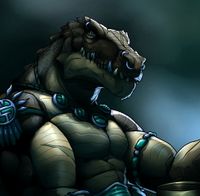 | |
| Race | |
| Pronunciation | All-lar |
| Classification | Gorr |
| Subraces | Many |
| Common Nicknames |
|
| Languages | Pidato |
| Naming Customs | Indonesian, not including Muslim/Arab names |
| Racial Traits | |
| Maximum Age | 200 years |
| Eye Colors | Slitted pupil (some also round) with a yellow/orange/blue/green iris and white or dark-gray sclera |
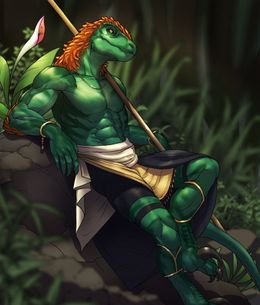
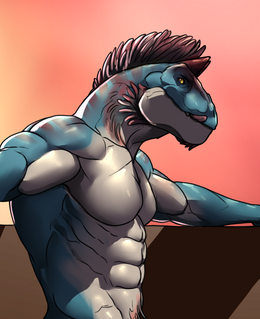
Originating from the mysterious jungles of Sendrass, the Allar are a diverse and varied Heritage of reptilian humanoids known for their societal flexibility and scientific capacity, and their boundless capacity to thrive in the harshest of conditions. The Allar have weathered many setbacks over the centuries, surviving that which would have crushed any other Race into oblivion, and turned detriment to their advantage. The most recent of these setbacks occurred during the Chrysant War, in which the Regalian Empire inflicted massive damage on the Allar and reduced their homeland to a backwater colony. In the fifteen years since, the Allar have not only overcome the losses of that war, but turned public opinion on them around, and became one of the founding Races of the Crown Alliance of the Regalian Empire, being some of its most prized and loyal citizens and filling government positions all the way to the top. Allar alchemists are the leading alchemical inventors of the world, having unrivaled skills in the identification, mixing, and application of alchemical substances. Their politicians remain flexible as ever and unburdened by the rigid Caste System that defines their society, allowing them to aid in their public perception unbothered by other duties of governance.
Core Identity
Science over Magi
The Allar are commonly believed the Race with the greatest intellect in scientific matters on Aloria. While other Races can certainly produce intellectuals, the Allar have a mental pre-disposition to insight, problem-solving, logic, and understanding complex linguistic, mathematical, and medical issues. Allar alchemists are prized around the world with unrivaled skills in identification, experimentation, and mixology, with nearly every alchemy business in the Regalian Empire having at least one Allar working at it. On the flipside of this heavy emphasis of the natural sciences, the Allar find Magic to be somewhat uncomfortable and incomprehensible, as it upends the laws of physics and reality, and makes everything unpredictable, exactly the way the Allar do not want to see the world. While it is certainly possible to find some Allar Mages, they most survive on the edges of a society that favors science over Magic.
Everyone their Place
Allar society is strongly defined by the social castes that they are born in. Allar very much a "planned society", where the upper classes dictate the manpower needs, and new populations are born through the help of a variety of alchemical concoctions. If one leader wishes for more labor forces, the next generation shall be born strong, while another leader might wish for better fishers, thus siring a generation of slender and agile aquatic Allar. An Allar is always born for a specific purpose and a specific role in their society, and it is very hard to break out of it, with much resistance from society at large. The Allar believe they have been able to weather traumatic events and terrible calamities specifically because of the stability afforded to them by their strict societal rules and hierarchy.
Surviving Today
Allar are extremely pragmatic and straightforward in securing their immediate needs. While most other Races seemingly make mistakes and toil with the issues for long periods of time, the Allar are uniquely aware of their immediate pyramid of needs, and will prioritize survival and overcoming, before considering long term thriving and improving of conditions. Allar are incredibly resilient, capable of receiving a great deal of mental anguish and torment over their conditions, knowing that they will above all survive, and that a better day will come where the struggle will have all been worth it. Certainly, the impressive swivels in their fortunes around the world have been evidence of this fact, with Allar quickly rising from one of the most oppressed people in the Regalian Empire, to some of its most respected and well-off people who have overcome levels of poverty that affected the Ailor for generations, in but a single lifetime.
All-Truths
The Allar have a curious life philosophy called Allteach or Guru in their native language. The idea of this philosophy, is that everything that is claimed, sad, or stated as fact, is at least partially true and must be investigated and should not be dismissed out of hand. It should come as no surprise that the Allar are a nexus of experimentation and trying new doctrines, ideas, plans, and designs. Sometimes, this experimentation and field-testing goes to extremes, like alchemy testing on prisoners, damaging the environment for science, and other unethical practices. Additionally, this philosophy has sometimes led to the rampant existence of conspiracy theories among the Allar, who continue to investigate theories that other Races or societies have rejected as completely nonsensical. The policy remains important however, as it has led to some of the most ingenious discoveries that were originally dismissed as unviable.
Design
Physical Characteristics
Simplest put, Allar are a Race of semi-aquatic reptile-like humanoids, though there is a very large range of design freedom within that distinction. Allar have humanoid bodies with two arms and legs, though the legs can be digitigrade and have lizard claws or even raptor claws, while they also have a tail that is either rigid or prehensile and can be so long as to drag behind them. Allar skins are scaled and sometimes even feathered (think raptors), while their heads are distinctly reptile-like (including turtles, crocodiles, lizards, dinosaur, but not snakes or birds). Allar can also have elements of aquatic mammals or fish (including amphibian salamanders) mixed in, for example a shark head, dolphin fins on the arms, or dunkleosteus bone plating. Designs may either disregard aquatic traits altogether, or lean fully into the aquatic design, for example a full-body shark humanoid. Allar use the practice of Kelahiran to infuse their eggs with genetic alterations that suit an Allar child more for one particular task over the other. This is why the Allar are so physiologically varied, because each generation is designed to fulfill a specific role in society, and acquires traits that are useful for this. For example, if Allar society needs more fishers, a batch of eggs may be altered to have crocodile-like snouts useful for catching fish, and shark-like fins and skin to make it easier to swim. If Allar society needs more fighters, a batch of eggs may be altered to have carnotaurus-like heads with broad shoulders and a predisposition to a more muscular frame. As such, there is no commonality in size between Allar, some are as short as Dwarves, while others as large as Urlan. Allar can grow to be 200 years old, and have less gender-dimorphism than for example Ailor, as they are an egg-laying species. As a result, they are incompatible with all other Races and as such Half-Allar do not exist. Allar can have scales, shark-like skin, feathers, horns, spikes, enlarged claws, short or long snouts, short or long necks, bone plating, club tails, feather tails, or pointed tails. Scale colors can be realistic from real-life animals, or fantasy colorations and patterns. if you need help designing, feel free to make a ticket!
Cultural Personalities
Allar personalities are also very varied because of Kelahiran resulting in fluctuating hormone levels, though their society can generally be defined by 4 major similar cultural outlooks listed below.
|
|
Heritage Traits

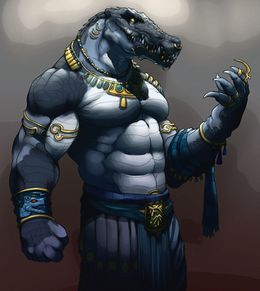
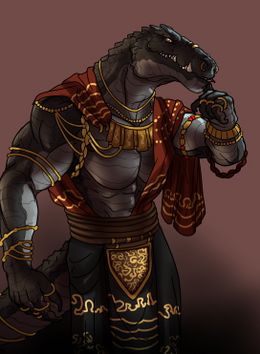
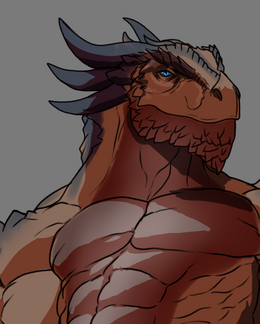

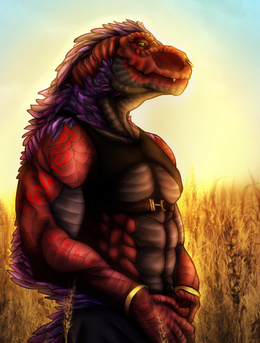
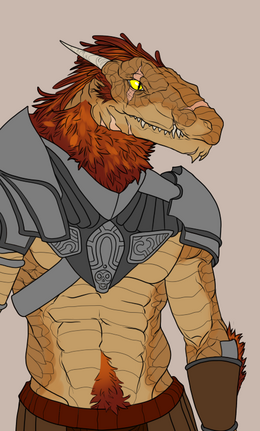
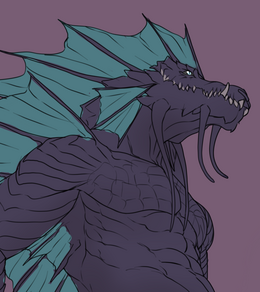
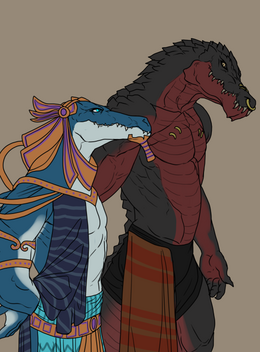
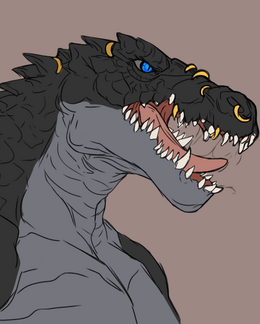
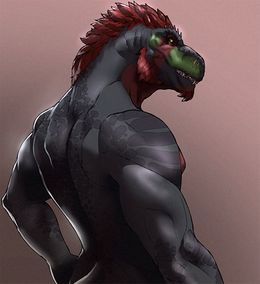
When designing a Character, Proficiency Points allow for a limited Ability selection with Point Buy Packs. Heritage Traits adds free Packs and Mechanics on top of that to help with cultural themes. Free Packs grant Abilities usually, while Mechanics change the way a character functions in Roleplay through subtle, and usually out of Combat ways. In essence, Mechanics just add aesthetic flair that invest in the niche of each culture. Free Packs never raise Proficiency Points, but the character must be able to purchase them normally. (ex. if a character is a certain Affinity that locks them out of a category, they cannot take that specific free pack and must choose the alternative option.) If a Free Pack grants Magic of some type, that Magic can be of any Alignment the character can normally choose, or limited to a select alignment, which will always be written in the Free Pack description.
Mixed Heritage characters (i.e. characters born from two parents of different Cultures) may take one parent's 'Free Packs' and mix and match up to 5 Mechanics from both parents, although some Peoples cannot produce Mixed Heritage children (due to Magical/Fantasy reasons). Allar cannot be included in Mixed Heritage Characters.
Mechanics
- Allar are immune to any (non Magical) disease or illness, such as viruses or bacteria, though they can become asymptomatic carriers.
- Allar bodyparts regrow over the timespan of 24 hours when lost, though scars can be left behind if desired.
- Allar have sensitive taste, their tongue capable of deeply analyzing anything they taste, what the ingredients are, and whether it has alchemical functions.
- Allar have perfect sight at night and in dark environments, capable of seeing in the dark without needing any external light source.
- Allar can breathe underwater without any Abilities, and can also see perfectly underwater without it blurring their vision, allowing them to stay submerged indefinitely.
Society
The Caste System
To understand Allar society, one must understand the Caste System and its various layers. To outsiders, the Caste System is suffocatingly restrictive and harsh on those who they consider on the bottom, though the Caste System is not that simple. Outsiders are often to compare the Caste System to their own capitalist poor masses, but because of the general lack of currency and self-reliance in Allar society, their Caste System works radically different. Resources and labor within the System are common good and work towards common interests, meaning the lower castes provide just as crucial of a role as higher castes. Below follows a list of the Castes, with general physical and mental descriptions that can be overlaid onto Cultural Personalities, ordered with most important at the top and least important at the bottom.
- The Rama Caste are the leading Allar of Allar society, usually large framed and dangerous looking in an attempt to cower the other Castes in line (think large crocodiles and carnivore dinosaurs), while also intimidating outsiders with their size. Rama are commanders, generals, admirals, task-masters, foremen, governors, and most importantly: Digmaan, the Allar variant of Nobility. Hadar itself is split into thousands of smaller Digmaan (term both used for the territory and the ruler) making most Rama standalone warlords.
- The Kertas Caste are the bureaucrats and administrators of Allar society, usually slender and nimble framed with large eyes and dexterous hands to excel at writing and reading. Kertas are authors, poets, writers, bureaucrats, administrators, scribes, historians, book keepers, and data analysts. Wherever there is a single Rama, there are always a dozen or so Kertas always running around them, with the Rama performing the politics, and the Kertas ensuring they have all the necessary paperwork to do their work well.
- The Kuat Caste are the physical laborers, the personal bodyguards of the Rama Caste, or cattle-herders. The Kuat Caste is bred for their large size, with each being quite beefy or stocky and durable, though having a far more calm and kind temperament than say the Rama, or the Ksat. The Kuat Caste is of higher importance in Allar society, because Allar prize civil service as socially more important than the military, leading to the Kuat having a venerable "protector" role within the Caste System of Allar Society.
- The Kyat Caste are the crafting-folk, the alchemists, the intellectuals, and the scholars. The Kyat Caste is often much smaller than the others, favoring intellectual development over physical size or brawn, and fulfilling a number of societal occupations like shopkeepers, farmers, alchemists, researchers, scholars, messengers, cleaning service, and other general service sector work. Kyat tend to be nervous and skittish, even around those within Allar society, preferring to stick around other Kyat for comfort.
- The Ksat Caste are the warrior caste, fiercely competitive, dogmatic, loyal and willing to pick a fight with any foe twice their size. The Ksat Caste tend to be lean and athletic, built for rapid deployment in combat and fierce fighting. Among the Ksat are soldiers, gladiators and ring fighters, assassins, hunters, trainers, and any other occupation that requires a modicum of adrenaline or reckless disregard for self. Ksat often bully Kyat Caste members, despite their higher rank, due to their boisterous nature.
- The Nang Caste are the mercantile and aquatic Caste, containing fishers, merchants, foreign diplomats, explorers, and aquatic warriors. The Nang Caste is considered lower in the Caste structure despite the value of merchants and diplomats, because they either live underwater (and thus removed from the majority of Allar society), or because they heavily interact with outsiders and currency which the Allar consider unclean, and a corrupting element that aims to upend the Caste System by creating private wealth.
- The Paria Caste are the untouchables. There is no real other way around it, those that belong to the Paria Caste are Mages generally speaking, as well as Arkenborn or Godborn, or anything else that isn't fully "normal" in the view of Allar society, even if they aren't strictly Occult. A member of another Caste can also be downgraded to the Paria Caste if they become Afflicted or Occult somehow, which is why it is exceedingly rare to find a Learned-Mage Allar, and sad to find a Born-Mage Allar. Despite being untouchable, the Paria Caste is still taken care of by the other Castes by given housing (on the edge of town), free food and services, they just can't be touched by non-Paria Caste members for fear of Occult infection. It should be noted that among Rumah-Allar, this is completely inverted, the Paria Caste is directly below the Rama Caste, and instead of being untouchable, they are eagerly accepted, with the Rumah-Allar believing access to the Occult brings good fortune, and they are given a more lavish lifestyle accordingly.
The Perpustakaan Besar
The Perpustakaan Besar sometimes also shortened to Perpusta or just Library, is an guild of highly skilled Alchemists that exists in Allar society as a pseudo government of sorts that regulates scientific experimentation and investigation as well as central houses of learning, and reliable publication sources for scientists. The Perpusta is the only organization of its kind in the world that fact-checks research papers and provides peer-reviews for new theories, meaning it is one of the most reliable centers of learning in the world. It has offices in all the major Allar cities, and several across other places in the Regalian Empire, such as the chapters in Ithania, The Rim Isles in the Regalian Archipelago, the City of Regalia itself, Nordskag, Etosil, and the Silerian Chain. Each of these chapter houses has a vast alchemical library, and storage for most known alchemical ingredients under the sun, including samples of mixtures and lessons on how to produce them, not to speak of the traveling guild towns on the backs of giant sea turtles. The Perpusta has soft power in Allar society even over the Digmaan, purely because they control the flow of information and also ensure that no Digmaan hoards any scientific research for their own political purposes. The Perpustakaan Besar also has a very important place in the Imperial Palace and the Scholar’s Court of the Regalian Empire, having integrated into their structure, and frequently seeing members travel in and out of the Palace to discuss scientific matters with the court scholars and the Emperor. Any Character can be a low or high ranking member, though Council members at the top are reserved for NPC's at Staff discretion.
Language & Names
The Allar speak a language called Pidato. Pidato as a language is based on real-world Indonesian, with all loan-words of English included. In lore, this is explained because the Allar deeply integrated with Regalian society, where Common is the first spoken language. As such, many loan-words from Common became established in Pidato, such as for example ‘bisnis’ for business, ‘gosip’ for gossip, ‘sistem’ for system, and ‘komplit’ for complete. Allar naming customs are generally simpler than that of other Races, as Allar don’t have surnames or middle names at all.
When it comes to first names, the Allar use Indonesian names. However, it is important to note that Indonesian names includes a lot of Arabic or Muslim inspired names, which should specifically be dis-included from this list. Allar names are generally non-gendered, and names are more based on the predicted temperament of the child, with children that are more soft and calm having names ending in “a”, while children that are more rowdy and energetic having names ending in “i”, though this is not a strict rule so much as it is a common trend.
- Example of Allar names: Bayu, Budi, Resa, Aditya, Bintang, Fadhlan, Bagaskoro, Banyu, Candra, Elang, Rimba, Surya, Kartika, Dewi, Aulia, Indah, Putri, Angkasa, Bulan, Merpati, Ndari, Mega
Allar do sometimes use their ancestral name as well, which is called the Namalama, based on the name of their parents. It is important to note that parents here means the people who raised the Allar, not the actual biological parents, because childhood practices will generally result in a child being raised by their non-biological parents. Most Regalian citizenship papers record both the first name and the Namalama, though the Namalama is only used in every-day as a way of formal introduction or as a means of showing deference to someone by including their Namalama in address. Namalama uses the following rules:
- If the leading parent was male, then the Namalama begins with the father’s name, followed by ‘ayah’ (the last vowel of the name may be removed to make it sound better). So for example, if the Allar was called Surya, and their father was called Putri, their name would be Putriayah, which becomes Putrayah to make it sound easier, so Surya Putrayah.
- If the leading parent was female, then the Namalama begins with the mother’s name, followed by ‘ibu’ (the last vowel of the name may be removed to make it sound better). So for example, if the Allar was called Angkasa, and the mother was called Bintang, their name would be Bintangibu, so Angkasa Bintangibu.
- If the leading parent was non-binary, then the Namalama begins with the paren’t name, followed by ‘cinta’ (the last consonant of the name may be removed to make it sound better). So for example, if the Allar was called Resa, and the parent was called Fadhlan, their name would be Fadhlancinta, which becomes Fadhlacinta to make it sound easier, so Resa Fadhlacinta.
Finally to complete the Namalama, a Namasarang is added, which is the name of the ‘nest’ in a crude translation. This name is only given to those who were also parented by their biological parents (which is particularly important among Rama, who without a Namasarang are not taken seriously), as this name is a continuation of blood-line. The Namasarang is usually just a word in Pidato, so for example the Pidato words for sun (matahari), red cliffs (tebing merah), merchant (pedagang) and so forth. In the examples above, in one of the above examples, if Resa Fadhlacinta was of the sun Namasarang, they would be called Resa Fadhlacinta Matahari, but in common day to day activities simply be referred to as Resa.
Religion
The Allar are Draconist faithful, having enjoyed historical patronage from and focus on the two Dragons Felicula and Umbra, who represent polar opposites on attitudes to life that the Allar believe combine into a more profound truth when observed together. Felicula represents all that is joyful in the world and the desire to enjoy life to its fullest, while Umbra represents the fact that all good things eventually come to an end, but that this is alright, because the ordained end is what makes their existence enjoyable to begin with. Felicula has traditionally resided in Hadar and was found by the Allar when they fled north there, departing the old Empire in Sendras. It is the assistance of her and her Clade of lesser Dragons that enabled their survival, and their slow and unavertable death to a strange (likely Magical) disease in the decades before Cataclysm that is the Allar's greatest trauma, though with the revival of Dragons slowly marching on worldwide, the majority of them have returned. Umbra meanwhile has always existed in Sendras, though the Void Worshiping Sendrassians did not acknowledge him as a God but as more of a primal entity to fear as the bringer of death. While most Hadarian Allar would portray Dragon Worship of Umbra as a continuity from the old way in the homeland, it is more the case that worship of Umbra only kicked off after the Allar fled to Hadar and encountered Felicula, adopting worship of Umbra as the other half of the duality more in hindsight. Though there has been no direct observation of him or his minions since the departure from Sendras, the continued existence of disease and death in the world implies that he is still there. Rumah-Allar, those who stayed behind in Sendras, are all Void Worshipers or rather Evolist worshipers, but with some differences. They have an unusual fear of Ifrit as the gatekeeper to the Void and the closest thing to the Devil, and an unusual view of Eloba, who they see as not benign but a scheming swamp witch who spreads rot, disease and venom to poison the land and anyone who dares stay where her hand has touched. Other than that, they tend to lack the contractual attitude that even the average Kathar has to their relationship with the Void Gods, genuinely believing in their benevolence (except for the two listed). There is additionally a sizeable but new minority of Allar Unionism worshipers introduced after the mass outflow of missionaries following the Chrysant War as well as the conversion of Allar inside the borders of the Regalian Empire, who have joined following the representation of an Allar god within the faith.
Fashion
Allar fashion is dominated by bright colors and tropical styles, reflecting the extravagant tastes from the Rama aristocracy down to the expressive nature of the Ksat. Within Hadar, many of the Allar go topless (which is also not strictly an issue for modesty since Allar don’t have breasts). Though in present times the Allar start dressing more and more like the Ailor, with full-body outfits, especially in Regalia, where the mild to cold climate can be considered unpleasant to the Allar, especially during winter. Colored glass is also very common both in clothing pieces as well as decorations, even the poorest of Allar has at least one colored glass bead bracelet or necklace. Fabrics are imported from all over the world to Hadar, as the Allar are known to like to experiment with fabrics of all different kinds, and have excellent craftsmen who fix up clothes to fit their proportions and horns or fins. Elastan, the lycra of the Asha, has proven very popular among the Allar, especially the aquatic Allar. Kyat, Rama, Nang, and Sang are the castes most commonly seen wearing jewelry. For Rama, it is a show of opulence and power, with intricately crafted gold piercings and metal perfectly shaped to fit their body and accentuate their features. Kyat usually wear smaller bracelets, rings, and face piercings, with the former being easily remove-able for when they must work with Alchemy. Nang will most commonly wear whatever jewelry is most popular at any given time, and Sang will exclusively wear hand-crafted adornments out of bone or coral they have harvested from the sea, or scavenged parts of jewelry from other Races found at the bottom of the seafloor.
History
Allar have existed in the world for several thousands of years, with first records of Sendrassian Allar appearing in Allorn archives around 5000 BC, with potential existence speculated thousands of years before that, though at this time their civilization was little more than a collection of tribes living in the jungles. The Allorn Empire tried numerous times to make formal contact with them, though the Allar remained agile in the jungles and were able to always clear away from any Elven ships before they made landfall. As time progressed and the Allar organized into more of a civilization, Allorn attempts to colonize and exploit Sendras became more and more dangerous, with the Void worshiping Allar tribes capturing and sacrificing any Elves who landed on their shores. How the Allar developed Void Worship centuries or even millennia before the Allorn Elves did, is unclear.
At some point in history, presumed around 1000 BC, some sort of conflict erupted in Sendrassian society, though the exact origins remain unclear. The Rumah-Allar claim that the Kota-Allar showed "betrayal of the Great Ones" (in reference to the Void Gods) while the Kota-Allar claim it was a rebellion against the cruelty and sacrifices of their people to the Void Gods. While it is easy to connect the two, Allorn records indicate that the truth is more complicated than a rebellion against tyranny, and that the Rumah-Allar aren't automatically at fault for being Void-Worshiping cannibalistic sacrifice-practicing tyrants. Allorn records imply some sort of societal calamity was occurring, and the only solution the Sendrassian Empire had was to sacrifice a part of their population, which then rebelled. The rebellion was successful and these Allar fled the Sendrassian Empire in large numbers on ships sailing north, while whatever calamity would occur, happened, and wiped out many Sendrassian cities including the golden capital which turned into an acid-sea.
History pays little attention to the Sendrassian Allar after this point, because few historical records have anything on them. Sendras was declared a "forbidden continent" by the Allorn Empire millennia before this, and the Allar who fled to Hadar refused to speak on it. The Allar arriving in Hadar found a mostly empty archipelago of tens of thousands of little islands, with only Sassrakkand, the Slizzar capital, and the Maraya state known as Tohsmaaq Venheer, holding land, with many of the islands uninhabited. This is also where they made first contact with the Yellow Water Dragons, who helped their society quickly recover from the damage of fleeing their homeland with nothing but a few rations, tools, and clothes. Allar society reformed around the Kota-Allar at first, with the Dibawa-Allar and Pelayaran-Allar cultural outlooks developing quickly after as they started creating contacts with the wider world.
Allar society was again hard hit during Cataclysm, as Hadar was mostly made up of volcanic islands, resulting in mass eruptions all across the continent due to the rampant magics. Many Allar had to flee their homes into the ocean, while for some escape came too late. Following the chaos and complete destruction of several major cities, the Slizzar offered to help rebuild, which turned out to be a Faustian bargain. As the centuries passed after Cataclysm, Allar society became more and more infiltrated by the Slizzar, who had effectively taken control of the top two Castes by either impersonating or seducing them into their service, thus finalizing the Allar into what they then called the Essa Empire, populated by Allar but ruled by the Slizzar. The Essa Empire was the only real Empire to rise from the ashes of Cataclysm, alongside the Songaskian and Regalian Empires, starting a game of geo politics between them.
Conflict would eventually erupt between Regalia and the Essa Empire in the 280's, called the Chrysant War, which was more of a genocidal war than a formal one. Regalian navies bombarded civilian targets and committed pogroms on cities that resisted their advance, culminating in the sacking of the capital Fessa Huallo where the Regalians killed tens of thousands of civilians, while most of the Slizzar infiltrators snuck away in the shadows, a fact which still causes a lot of resentment among the Allar who feel their Race was goaded into a conflict with Regalia that they did not want, all for the puppet games of the Slizzar who took none of the damage for it. The Allar in Hadar were effectively reduced to a backwater colony by the Regalian Empire, occupied by their superior weaponry (due to the recent invention of the cannon while the Allar still used bows).
Allar society however recovered, by quickly ingratiating itself to the Regalian Empire, and proving itself invaluable in a variety of sectors. Instead of being resentful against their new overlords, the Allar managed to overcome their racial stigma, prove their loyalty, and eventually become so crucial to the proper functioning of Regalian society, that they effectively became part of it on equal terms with Ailor. In recent years, Hadar has suffered conflict due to the advances of civil organization, as well as war. The Sendrassian Empire re-emerged in a spectacular way with a full-blown invasion of South-Hadar, in a war that Regalia effectively lost, ceding territory to it (though some will continue to claim it was a stalemate). Then, there are those in Hadar who want to abandon the Caste System and join Regalia's currency-based capitalist standard, and those who want to hold onto the old ways. This conflict caused a civil war, largely between the Kota-Allar led by the Triumvirate of Progress, and the Dibawa-Allar led by the Deep-thought Council who wants to hold onto the old ways. The Pelayaran-Allar have thusfar avoided the conflict and declared neutrality, though the civil war continues to rage on while Allar in Regalia can only watch.
World View
World View is optional content that helps give Allar flavor and depth.
- Allar are a mostly carnivorous Race that eats a combination of fish, meat and insects, either roasted or raw. They are capable of also digesting vegetables, nuts, and roots, but only see these as condiments and additions to their main course.
- Rama, even when each other’s lovers or siblings, will continue to make public appearances of competition. Even if they deeply care for one another, they cannot stand being seen as the inferior partner in public, and will publicly argue and fight for appearances sake.
- A form of showing subservience, obedience or submission among the Allar is to tip the nose upwards and expose the throat to those who are worthy of being respected as above one’s self. This is to emulate exposing the neck, the most vulnerable spot on an Allar’s body in trust or subservience.
- Engineering has a somewhat complicated place in Allar society. Among the Allar, technology and alchemy constantly compete over what is the superior scientific craft, and the majority of Allar society supports alchemy in this endeavor. Though, Technicians among the Allar have developed Chemtech in an attempt to merge the two.
- The best gift to be given to an Allar is a basket of rare alchemical ingredients. Save for the most combat or solitary hunter of Allar, alchemical ingredients have a value beyond money. Even if an Allar does not do alchemy themselves, giving them ingredients allows them to give these valuable gifts to someone else, an act in itself that is valuable.
- A common social gathering among Kyat Allar is to bring a number of small unmarked alchemical vials that they have crafted, usually two to three per Kyat, and play a game of roulette in imbibing or drinking them to witness their effects. Part of the game is determining who made what, based on their skill level, personal tastes, and preferences.
- While it is exceptionally rare for Allar to act outside of the caste system, those who do are usually shunned and completely avoided and ignored by other Allar. If an Allar must ever explain why they do so to a non-Allar, they will usually say something along the lines of “not seeing those who choose to wallow outside of order.”
- Allar highly value second opinions on research and their work, and many Kyat Allar especially will compete with each other by trying to attain the largest peer-review listing to flaunt to others. It is a common saying that an Kyat will only be happy when their list of references circles Aloria.
- Allar society is the only known society in the world that takes mental illnesses, and in fact depression in particular, very seriously. Allar society has developed a number of alchemical mixtures and tinctures to combat the negative effects of such ailments, and has developed a very wide treatment for Allar who suffer from depression by combining medical treatments with therapy. This practice is however very slow to catch on in other societies due to the inherent stigma. Post traumatic stress is for example barely recognized in Regalia, simply referred to as ‘Knight’s Disease’, which is left untreated outside of a whorehouse.
- A combination of their unique biology and the hot, humid climate of Hadar led to the Allar developing a very unique relationship with Music. Allar mostly prefer singing and vocal arts, but uniquely also use an instrument they developed called the “Thermin.” The Thermin uses a combination of freshly mixed alchemy and engineering to create a small wall of alchemical vapor that the Allar can wave their hands through, with the disruptions creating unique sounds. This allows for ‘hands free’ music, and produces a unique set of sounds unheard of by any other instrument. It is usually shaped like a delicate metallic box, with slits at the top, and is propped up waist-height in front of the Allar who is playing it.
- Dragon Worship is frequently picked by Allar within the framework of Keyakinan as their dominant religion, due to the deep folklore of the Yellow Water Dragons. The Allar have many stories of their arrival in Hadar, and how it was mostly inhabited by critters, Slizzar, and more notably, Yellow Water Dragons. They say that the Yellow Water Dragons (who were about the size of dogs) were extremely playful, and helped them establish the first irrigation systems to make their islands green and fertile. The Yellow Water Dragons continued to live alongside the Allar and play with them, until a mysterious disease wiped them out several decades before the Cataclysm. The Allar tried with all their might to cure the disease through alchemy, but failed in the end, and the loss of the Yellow Water Dragons still exists in the psyche of the Allar as a deep social trauma. The Perpustakaan was founded after the Dragons were lost to the Allar, to make up for the shortcomings in communication between the various efforts to cure them, to ensure that in the future there would always be an answer to calamities of this nature.
- The Allar have developed a unique method of communication, based on Sign Language, that they used to communicate with mute or deaf peoples, as a part of their studies. It was originally developed by the Aquatic Allar, who also found it useful for quickly getting messages across while underwater. This is why universal Sign language exists in Aloria. Sign Language is not "buyable" as a Point Buy Pack, any character can just add it into their backstory.
Trivia
- Each member of the leading council of the Perpustakaan Besar is one of 24, the 24 brightest and most successful alchemists of the Allar at any given time. Each member invented a great alchemical mixture that advanced the Allar Race as a whole.
- Allar were once badly treated in the Regalian Empire, however their luck swiveled due to the so called Satrillian accords. The rumor goes that Emperor Alexander named the accords as such, after an Allar he grew familiar with in the times when he was not yet on the throne, called Satril Meray. The story goes that the Emperor was touched by the obedience and loyalty that Satril showed, despite being spat on by Ailor customers of the tavern, and would always clean without complaint, believing that all Allar would be so loyal and dedicated to service in the Empire.
- The Allar are the only Race in the Empire that does not have an embassy in the Regalian capital, or some form of consulate. This is because the Allar are so deeply integrated in the Regalian state apparatus, that they are basically considered on the same level as Ailor in terms of civil rights, and have no need for consulates to fight for their rights.
| ||||||||||||||||||||||||||
| Accreditation | |||||||||
|---|---|---|---|---|---|---|---|---|---|
|
| ||||||||
